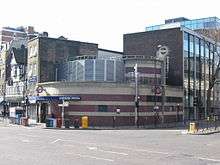Long Lane (Southwark)

.jpg)

Long Lane is a major road in Southwark, south London, England.
At the northwest end is a complicated junction with Borough High Street, Marshalsea Road, Tabard Street, and Great Dover Street. The historic St George the Martyr church, with Dickensian connections, is at this junction, now standing on an island surrounded by roads and cut off from its original churchyard. In this church the eponymous Dickens character Little Dorrit was baptised and married. Charles Dickens himself lodged close by as a child in Lant Street when his father was in the Marshalsea debtors' prison during 1824. It was a traumatic period of his life. Also at this junction is the Borough tube station.
The road is designated the A2198. At the southeast end, there is a junction with Tower Bridge Road (the A100). Near this junction, it crosses Bermondsey Street (the A2205).
There have been a number of archaeological excavations on Long Lane.[1][2][3]
History
Long Lane originally led from the site of Bermondsey Abbey to the High Street by St George's Church.[4] It was created by the Priory/ Abbey to connect its Bermondsey landholding to that of the southern end of the High Street and to its manor on the western side of Southwark which later became known as St George's Fields sometime from 1104. The land to the north of Long Lane was called Snow Fields in the eighteenth century and a street of that name runs through the same area.
See also
References
- ↑ Long Lane, Southwark, Wessex Archaeology. Archaeological evaluation at 174–178 Long Lane.
- ↑ Brown, Gary, An Archaeological field evaluation at 169 Long Lane, London Borough of Southwark. London: Pre-Construct Archaeology, 1995. National Grid Reference: TQ 324494 7957.
- ↑ Douglas, A., An excavation at 5–27 Long Lane, Southwark, London SE1, Transactions of the London and Middlesex Archaeological Society. Forthcoming.
- ↑ H.E. Malden (editor), The borough of Southwark: Introduction, A History of the County of Surrey: Volume 4 (1912), pp. 125–135.
External links
- Long Lane, London SE1
- LondonTown.com information
- Long Lane, Southwark Shopping Guide
- Shops on Long Lane, SE1
- Long Lane, Southwark, London SE1 — house prices
- Bermondsey Square and Long Lane: London in the snow, photograph from Flickr
Coordinates: 51°29′57″N 0°05′10″W / 51.4993°N 0.0860°W